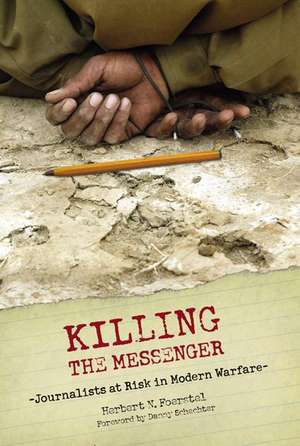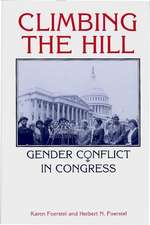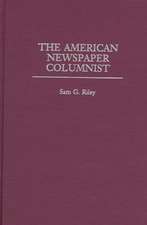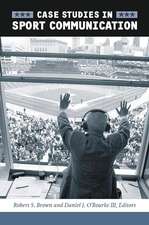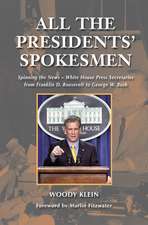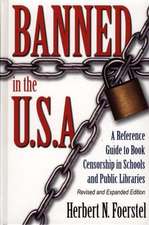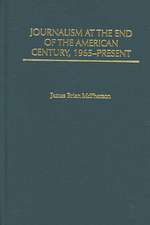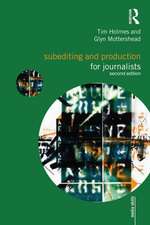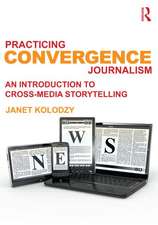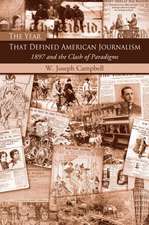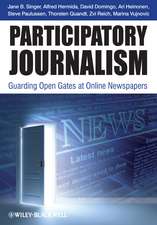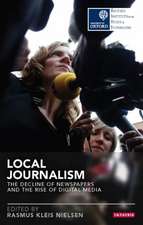Killing the Messenger: Journalists at Risk in Modern Warfare
Autor Herbert N. Foerstelen Limba Engleză Hardback – 29 mar 2006 – vârsta până la 17 ani
Preț: 363.38 lei
Preț vechi: 478.67 lei
-24% Nou
Puncte Express: 545
Preț estimativ în valută:
69.54€ • 72.33$ • 57.41£
69.54€ • 72.33$ • 57.41£
Carte tipărită la comandă
Livrare economică 14-28 aprilie
Preluare comenzi: 021 569.72.76
Specificații
ISBN-13: 9780275987862
ISBN-10: 0275987868
Pagini: 176
Dimensiuni: 156 x 235 x 19 mm
Greutate: 0.42 kg
Editura: Bloomsbury Publishing
Colecția Praeger
Locul publicării:New York, United States
ISBN-10: 0275987868
Pagini: 176
Dimensiuni: 156 x 235 x 19 mm
Greutate: 0.42 kg
Editura: Bloomsbury Publishing
Colecția Praeger
Locul publicării:New York, United States
Notă biografică
Herbert N. Foerstel is the former Head of Branch Libraries at the University of Maryland, board member of the Freedom to Read Foundation, and editor of Maryland Library Association's newspaper. He is the author of many books on free press issues, including Refuge of a Scoundrel: The Patriot Act in Libraries (Libraries Unlimited, 2004), Banned in the U.S.A.: A Reference Guide to Book Censorship in Schools and Public Libraries (Greenwood Press, 2002), From Watergate to Monicagate: Ten Controversies in Modern Journalism and Media (Greenwood Press, 2001), Freedom of Information and the Right to Know (Greenwood Press, 1999), Banned in the Media: A Reference Guide to Censorship in the Press, Motion Pictures, Broadcasting, and the Internet (Greenwood Press, 1998), Free Expression and Censorship in America: An Encyclopedia (Greenwood Press, 1997), and Surveillance in the Stacks: The FBI's Library Awareness Program (Greenwood Press, 1991).
Cuprins
IntroductionThe Dangers of Reporting Conventional WarJournalism and the New Face of WarPersonal Stories of Abduction, Torture, and DeathWhy do they hate us?Protecting Journalists at a Cost to NewsgatheringSelected BibliographyIndex
Recenzii
The job of war correspondent has always been a risky occupation. This book shows how the work has become far more dangerous in recent years. Foerstel demonstrates this fact with numerous accounts of abduction, death, and torture. He points out that in places like Afghanistan and Iraq there are no front lines, and reporters are always at risk. And there are other problems. Most reporters are strangers in strange lands and lack cultural knowledge and language skills. Thus, they must rely on local aides, which makes real first-hand reporting difficult and results in incomplete stories. In addition, reporters are often seen not as neutral observers but rather as part of the enemy. They may even be viewed as spies working for the CIA, a problem magnified by past efforts of the agency to use reporters as spies. A safer alternative might be to be embedded with US troops and abandon any real effort at firsthand news gathering. In all cases the quality, quantity, and veracity of news reports suffer. Foerstel supports his study with extensive endnotes..Recommended. Lower-division undergraduates and general readers.
Foerstel here brings home the dangers facing today's war correspondents. After a retrospective chapter that covers seminal war correspondents who served from the American Civil War through most of the 20th century, he focuses on recent conflicts, including the Lebanese civil war of the 1970s and 1980s and today's Afghanistan and Iraq wars. Foerstel mixes the words of former hostages, current war correspondents, and authors, among others, to convey how truly life-threatening war reporting has become. Including narratives from, and his own interviews with, such former hostages as Terry Anderson, kidnapped in Lebanon in 1985 and held for over six years, the book is a highly credible and engaging read. Foerstel's general conclusion is that the current lack of security in Iraq makes it difficult for reporting (with the exception of secured portions of Baghdad) and that there is only so much that reporters can do to decrease their risk of harm. The Iraq conflict also stands out for its high degree of brutality, with journalists purposely chosen as targets so that kidnappers can get messages across most fully from the reporting of fellow journalists. Suitable for academic libraries, especially those with substantial collections in journalism, communications, or military affairs.
[B]rings home the dangers facing today's war correspondents. The book describes the new dangers they face, and attempts to explain why correspondents are targeted.
Although the journalist has always been at danger while covering conflict, today's wars with unclear battle lines and shadowy foes create a new hazard for reporters. In Killing the Messenger, author Herbert N. Foerstel takes a look at the modern environment for war reporting and all the dangers in includes.
As of mid-March of 2006, 86 media workers had been killed in the Iraq war and 38 kidnapped, according to Reporters Without Borders. In this work, Foerstel introduces the reader to the growing dangers faced by war correspondents, frequently employing the words of the correspondents themselves. He includes the stories of Philip Caputo, Jerry Levin, Terry Anderson, Daniel Pearl, and Scott Taylor, journalists who were abducted, tortured, and, in one case, murdered as they attempted to do their jobs. He also presents a debate on the reasons that journalists have come to be targeted by all sides of current conflicts in the Middle East and provides advice to journalists, editors, and press organizations on how to minimize the dangers of modern war reporting.
As the conventional warfare of the two world wars has evolved to more urban warfare with no clear front lines, war correspondants have gone from obserers to collateral casualties to targets. Foerstel, who has written extensively on free press issues, examines the reasons for the changes in warfare, the impact on war reporting, and the corresponding effect on providing perspective on international conflicts..This is an impressive and thoroughly engrossing look at the perils of reporting on modern warfare.
While acknowledging the traditional dangers of covering wars, Foerstel attempts to understand why enemy insurgents in Iraq are deliberately targeting western war correspondents..As journalists continue to be kidnapped, killed and injured in Iraq, it is clear there are no longer discernable rules, no single enemy and few, if any, formal lines of communication.
Foerstel here brings home the dangers facing today's war correspondents. After a retrospective chapter that covers seminal war correspondents who served from the American Civil War through most of the 20th century, he focuses on recent conflicts, including the Lebanese civil war of the 1970s and 1980s and today's Afghanistan and Iraq wars. Foerstel mixes the words of former hostages, current war correspondents, and authors, among others, to convey how truly life-threatening war reporting has become. Including narratives from, and his own interviews with, such former hostages as Terry Anderson, kidnapped in Lebanon in 1985 and held for over six years, the book is a highly credible and engaging read. Foerstel's general conclusion is that the current lack of security in Iraq makes it difficult for reporting (with the exception of secured portions of Baghdad) and that there is only so much that reporters can do to decrease their risk of harm. The Iraq conflict also stands out for its high degree of brutality, with journalists purposely chosen as targets so that kidnappers can get messages across most fully from the reporting of fellow journalists. Suitable for academic libraries, especially those with substantial collections in journalism, communications, or military affairs.
[B]rings home the dangers facing today's war correspondents. The book describes the new dangers they face, and attempts to explain why correspondents are targeted.
Although the journalist has always been at danger while covering conflict, today's wars with unclear battle lines and shadowy foes create a new hazard for reporters. In Killing the Messenger, author Herbert N. Foerstel takes a look at the modern environment for war reporting and all the dangers in includes.
As of mid-March of 2006, 86 media workers had been killed in the Iraq war and 38 kidnapped, according to Reporters Without Borders. In this work, Foerstel introduces the reader to the growing dangers faced by war correspondents, frequently employing the words of the correspondents themselves. He includes the stories of Philip Caputo, Jerry Levin, Terry Anderson, Daniel Pearl, and Scott Taylor, journalists who were abducted, tortured, and, in one case, murdered as they attempted to do their jobs. He also presents a debate on the reasons that journalists have come to be targeted by all sides of current conflicts in the Middle East and provides advice to journalists, editors, and press organizations on how to minimize the dangers of modern war reporting.
As the conventional warfare of the two world wars has evolved to more urban warfare with no clear front lines, war correspondants have gone from obserers to collateral casualties to targets. Foerstel, who has written extensively on free press issues, examines the reasons for the changes in warfare, the impact on war reporting, and the corresponding effect on providing perspective on international conflicts..This is an impressive and thoroughly engrossing look at the perils of reporting on modern warfare.
While acknowledging the traditional dangers of covering wars, Foerstel attempts to understand why enemy insurgents in Iraq are deliberately targeting western war correspondents..As journalists continue to be kidnapped, killed and injured in Iraq, it is clear there are no longer discernable rules, no single enemy and few, if any, formal lines of communication.
